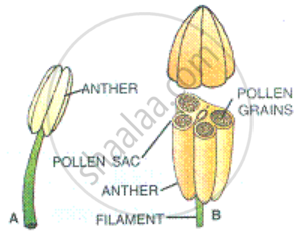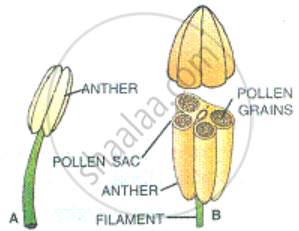Advertisements
Online Mock Tests
Chapters
2: Cell : The Unit of Life
3: Tissues : Plant and Animal Tissues
▶ 4: The Flower
5: Pollination and Fertilization
6: Seeds - Structure and Germination
7: Respiration in Plants
8: Five Kingdom Classification
9: Economic Importance of Bacteria and Fungi
10: Nutrition
11: Digestive System
12: Skeleton - Movement and Locomotion
13: Skin - "The Jack of all Trades"
14: The Respiratory System
15: Hygiene - [A Key to Healthy Life]
16: Diseases : Cause and Control
17: Aids to Health
18: Health Organisation
19: Waste Generation and Management
![Selina solutions for Concise Biology [English] Class 9 ICSE chapter 4 - The Flower Selina solutions for Concise Biology [English] Class 9 ICSE chapter 4 - The Flower - Shaalaa.com](/images/4567167791-concise-biology-english-class-9-icse_6:778c9d06bf3248a296d8ab25ff5c174b.jpg)
Advertisements
Solutions for Chapter 4: The Flower
Below listed, you can find solutions for Chapter 4 of CISCE Selina for Concise Biology [English] Class 9 ICSE.
Selina solutions for Concise Biology [English] Class 9 ICSE 4 The Flower Multiple choice type [Page 37]
Bougainvillea flower is an example of
incomplete flower
having a large nectary
water pollination
large colourful bracts
A flower is said to be complete when:
It has the corolla and calyx
It has the corolla and gynoecium
It has the androecium and gynoecium
It has all the four whorls
The part of the flower that gives rise to the fruit is
Sepals
Petals
Ovary
Stamens
The part of the flower that gives rise to the seed is
Ovary
Placenta
Ovule
Pollen grain
The essential whorls of a flower are the
Calyx and corolla
Stamen and ovary
Calyx and epicalyx
Androecium and gynoecium
Selina solutions for Concise Biology [English] Class 9 ICSE 4 The Flower Very short answer type [Page 37]
Match the parts in Column A with the flowers or parts of the flower in Column B.
|
Column A |
Column B |
|
(a) Polyadelphous |
(i) Polypetalous |
|
(b) Pollen grains |
(ii) Calyx, corolla |
|
(c) Free petals |
(iii) Nectar |
|
(d) Non-essential |
(iv) Bombax |
|
(e) Sweet fragrant fluid |
(v) Pollen sac |
Selina solutions for Concise Biology [English] Class 9 ICSE 4 The Flower Short answer type [Page 37]
Explain the following term:
Incomplete flower
Explain the following term:
Staminate flower
Explain the following term:
Pistillate flower
Explain the following term:
Bisexual flower
Distinguish between the following pairs:
Flower and inflorescence
Distinguish between the following pairs:
Petals and petaloid sepals
Distinguish between the following pairs:
Polyandrous and polyadelphous androecium
Where the following structures/parts located and what are their functions?
Placenta
Where the following structures/parts located and what are their functions?
Thalamus
Where the following structures/parts located and what are their functions?
Anther
Where the following structures/parts located and what are their functions?
Stigma
Why are the following described as stated:
The androecium of pea flower is diadelphous
Why are the following described as stated:
Ray florets of sunflower are neuters.
Why are the following described as stated:
Salvia sepals are petaloid.
Selina solutions for Concise Biology [English] Class 9 ICSE 4 The Flower Long answer type [Page 37]
Name the different types of androecium found in flowers.
Name the type of androecium found in china rose.
Name the type of androecium found in bombax .
Name the type of androecium found in pea.
Selina solutions for Concise Biology [English] Class 9 ICSE 4 The Flower Structured/Application/Skill type [Page 37]
The figure given alongside represents a generalized arrangement of the different parts of a bisexual flower. Name the parts numbered 1-10.

Given below are two figures (A and B) of a certain part of a flower. Study the figures carefully and answer the following question:

Which major organ of a flower does the figure A represent? What is the collective term for this organ ?
Given below are two figures (A and B) of a certain part of a flower. Study the figures carefully and answer the following question:

Are the contents of the pollen sacs in B male or female?
Given below are two figures (A and B) of a certain part of a flower. Study the figures carefully and answer the following question:

Can you state how the contents of the pollen sacs would come out?
What are bracts? State their function.
Explain the terms Monadelphous, Diadelphous and Polyadelphous. In each case name a flower possessing such an androecium.
Solutions for 4: The Flower
![Selina solutions for Concise Biology [English] Class 9 ICSE chapter 4 - The Flower Selina solutions for Concise Biology [English] Class 9 ICSE chapter 4 - The Flower - Shaalaa.com](/images/4567167791-concise-biology-english-class-9-icse_6:778c9d06bf3248a296d8ab25ff5c174b.jpg)
Selina solutions for Concise Biology [English] Class 9 ICSE chapter 4 - The Flower
Shaalaa.com has the CISCE Mathematics Concise Biology [English] Class 9 ICSE CISCE solutions in a manner that help students grasp basic concepts better and faster. The detailed, step-by-step solutions will help you understand the concepts better and clarify any confusion. Selina solutions for Mathematics Concise Biology [English] Class 9 ICSE CISCE 4 (The Flower) include all questions with answers and detailed explanations. This will clear students' doubts about questions and improve their application skills while preparing for board exams.
Further, we at Shaalaa.com provide such solutions so students can prepare for written exams. Selina textbook solutions can be a core help for self-study and provide excellent self-help guidance for students.
Concepts covered in Concise Biology [English] Class 9 ICSE chapter 4 The Flower are Placentation in Flower, Flower, Structure of a Bisexual Flower, Types of Flower, Sexuality in Flowers, Inflorescence in Flower.
Using Selina Concise Biology [English] Class 9 ICSE solutions The Flower exercise by students is an easy way to prepare for the exams, as they involve solutions arranged chapter-wise and also page-wise. The questions involved in Selina Solutions are essential questions that can be asked in the final exam. Maximum CISCE Concise Biology [English] Class 9 ICSE students prefer Selina Textbook Solutions to score more in exams.
Get the free view of Chapter 4, The Flower Concise Biology [English] Class 9 ICSE additional questions for Mathematics Concise Biology [English] Class 9 ICSE CISCE, and you can use Shaalaa.com to keep it handy for your exam preparation.
